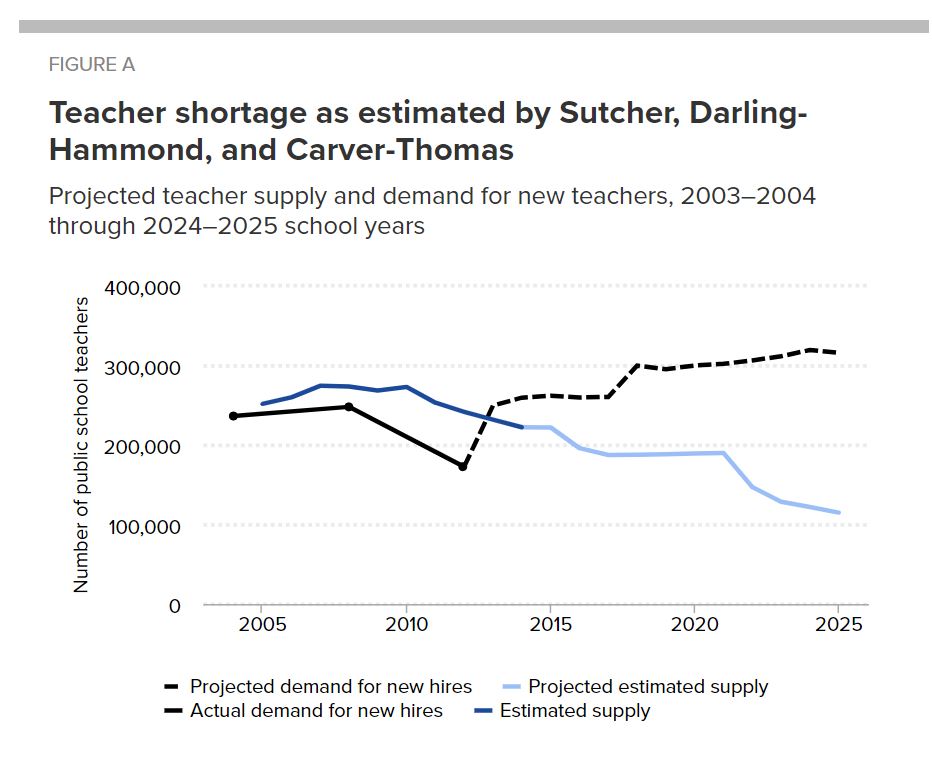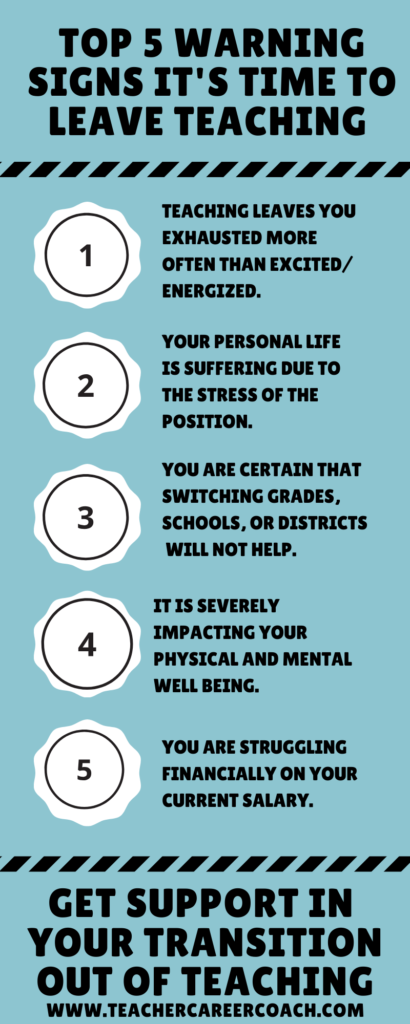Are you considering quitting teaching? If so, you’re not alone. The recent global pandemic has 1 in 4 teachers considering a new career. But even before the pandemic, teachers quit for many reasons. 44% of teachers leave within the first five years in the profession. (That’s well over a third of new teachers.) In general, newer teachers are 2½ times more likely to quit than those who are tenured. Regardless, an astounding 8% of teachers start over with a new career each year.
If you need help leaving the classroom, check out the Teacher Career Coach Course. This step-by-step guide has helped thousands with a transition from teaching. Save time and get support with every step of picking a new path, rewriting your resume, and answering tricky interview questions.
I’m one of these statistics. I quit teaching within my first five years. There were many reasons why I left teaching. Ultimately, I found happiness in a career working in educational consulting and instructional design. But before I left the classroom, I questioned if quitting teaching was the right move. After all, I assumed it would be my forever career. You can hear all about my story of transitioning out of the classroom on the Teacher Career Coach Podcast.
Since you’re here, I’m assuming you can relate. Maybe you’re curious to know why many teachers quit in the first place. Or perhaps you’re looking for validation to know if quitting teaching is the right move for you.
While only you know the ultimate answer for you, keep reading to learn why most teachers ultimately decide that quitting teaching is the right decision for them. Leaving the classroom is far from a one-size-fits-all situation. However, I hope this post can help you find clarity around the right decision for you.
So. . . Why Do Teachers Quit?
Unfortunately, there are many reasons why teachers quit. Many enter the profession wanting to make a difference in the community and their students’ lives. However, they quickly realize they are stifled by unrealistic expectations, ever-changing initiatives, limited opportunity for growth, and lack of support. (Just to name a few.)
All of this adds up. The results of an Educator Quality of Work-Life survey revealed that teachers are facing poor mental health at twice the rate of the general workforce. An alarming 21% of teachers reported experiencing poor mental health upwards of 11 days per month. While there’s no denying that teaching is a difficult job, the difficulty does not mitigate feelings of being unhappy, unhealthy, unfulfilled.
The supply and demand for teachers is growing as shown in the figure below. And although 50% of teachers have considered quitting, policy changes to support teachers are still lacking and minimal. (And are often only achieved after union intervention or teacher walk-outs.) As long as the expectations and responsibilities continue to pile up without any changes in policies, respect, and support, teachers will continue to leave the profession.
Want to hear directly from former teachers why they quit? Listen to interviews with former teachers on The Teacher Career Coach Podcast.

Why Teachers Quit: Stress and Burnout
Perhaps the biggest reason why teachers quit is stress and burnout. While the ongoing pandemic has certainly added more stress on teacher’s plates, stress is nothing new. In one study conducted prior to the pandemic, 23% of teachers reported their work as always being stressful. Meanwhile, a whopping 38% of teachers cited their work as being often stressful. Add in the Coronavirus pandemic and as many as 1 in 4 teachers considered quitting at the end of the 2020-2021 school year.
Unfortunately, as a former teacher, it’s no surprise to me that stress is leading teachers to quit the profession. Teachers are spread thin with unrealistic expectations and never-ending to-do lists. Over time, these unhealthy norms of the job lead many teachers to experience a lack of work-life balance and personal well-being. Learn more about making teaching sustainable here.
Teachers are expected to help achieve high test scores while simultaneously maintaining classroom management and keep up with extracurricular activities. The workload can often leave teachers facing long hours far beyond their work duties. Teachers become tired of spending their nights and weekends grading assignments and planning lessons that couldn’t get done during their contracted hours.
Arriving early to set up the lessons and staying late to grade papers can have its toll on your mental well-being (and personal life). In my last year of teaching, I worked on the majority of my weekends. I opted out of birthday celebrations to grade assignments instead, a trip to Hawaii with my fiance’s family to prepare for the upcoming parent-teacher conferences, and rarely felt I had the time (or energy) to see anyone. It felt like my job was taking over my life and, ironically, I still felt like I wasn’t doing enough. The result? I suffered from teacher burnout.
Teacher Burnout
For many, Teacher burnout is an extreme result of chronic stress. It can cause depression, anxiety, and other mental health issues. I found myself in the doctor’s office on a regular basis. Eventually, they were able to tie my clenched jaw, new (and frequent) headaches, and stomach issues to work-related stress.
After I quit teaching, I slowly returned to myself. My stress-related symptoms drastically improved and I was able to focus on things that lit my fire and gave me a sense of value and purpose. I had always thought I would get that from teaching, but it just wasn’t for me. (And that’s okay.) Teacher burnout is NOT synonymous with failure. So whether you’re experiencing burnout after year 1, year 5, or year 15, it’s valid. Teacher burnout often results from juggling numerous responsibilities, expectations, and initiatives without a strong support system or sense of respect.
So, if you think you might be suffering from teacher burnout, hear me out. Sometimes we need to put our own needs before the needs of others. Teachers often put the needs of others first. It’s in our nature. But when it comes to your well-being, there’s nothing wrong with being a little selfish.
Related: Stress Management for Teachers: 5 Strategies to Implement TODAY!
Why Teachers Quit: Toxic Climate and Lack of Support
Another major reason teachers quit is due to a toxic climate, often exacerbated by a lack of support. Teachers are more likely to feel valued and inspired when working in a psotive and supportinve environemnt. That sense of value is highly motivational as they tackle the daily challenges of the teaching profession. A lack of such culture can not only lead to a diminished sense of value and a decrease in inspiration, but to an unclear sense of purpose as well.
Toxic teaching environments are often filled with micro-managing and little to no autonomy. There is often a lack of support and both bullying and harassment. This harassment can come from the administration, co-workers, students, and parents alike. While teachers were once valued as experts in their field, more and more teachers report a lack of respect and support from everyone ranging from administration and school boards to parents.
Administrators that are not supportive of their staff may drive many teachers out of the classroom altogether. Coupled with stress, toxic school climates and lack of support are often leading culprits of Teacher burnout.
Unfortunately, this lack of support isn’t only causing teachers to leave after years in the field. A staggering 40% of future teachers don’t ever even make it to the classroom. When student-teaching and entering the world of education, it’s easy to quickly identify the lack of adequate mentoring to prepare you for all of the challenges you face in the classroom. The reality of classroom management issues, lack of funding, overpopulated classroom sizes, and heavy workload usually shock those new in education.
Why Teachers Quit: Lack of Upward Mobility Within School Systems
Within a school district setting, there are few options for a teacher to leverage themselves into new and exciting roles. While some teachers leave the classroom for administration, TOSA, or curriculum specialist positions, many find themselves in a career standstill. As years go on, they have less motivation to grow their career skill sets. The professional development opportunities that administration does offer are often stale, unrelatable, or missing teachers’ biggest pain points altogether.
It doesn’t help that many teachers face the unspoken expectation of teaching being their forever career. With that said, teachers who consider quitting often face an unfair stigma. People often frown upon teachers leaving to seek career opportunities elsewhere and it can be seen as an easy way out by others in the school system. Yet, the average person changes jobs around 12 times. Unfortunately, many teachers may have less than three, with teaching being their final position.
While teaching most certainly is an admirable career, there’s nothing wrong with wanting a change. Many teachers enter the profession without the desire to move up into administration or other district roles. If that sounds like you, know that there are other options when you step outside of the school system. In fact, there are opportunities to work within educational companies where you can still have an impact on students and teachers. Teachers are often ideal candidates for roles within edtech, consulting, and instructional design.
Why Teacher Quit: Better Financial and Career Opportunities
Another reason why teachers leave the classroom is in search of better financial and career opportunities. The national average salary for a public school teacher is just over $63,500. However, the average starting salary is barely over $40,000. Keep in mind, that’s with over 55% of teachers having a post-baccalaureate degree.
However, despite what many believe, low salary doesn’t top the list of why teachers quit. Even with the low pay, teachers often opt to pay on average $500 in out-of-pocket expenses for their own classrooms. Teachers go into the classroom understanding the low salary, but the low salary combined with long days (hours beyond contracted time) and consistent stressors can put them over the edge. Combine a low salary with other issues, such as a toxic school climate or teacher burnout, and teachers are willing to entertain the plethora of higher-paying options outside the classroom.
While already feeling undervalued and unsupported, teacher salaries reportedly fall just shy of 20% less than those of similarly skilled professions. It’s no wonder why teachers are quitting. After realizing how much work is expected of them, it’s difficult for them to not start looking to other careers that pay more.
However, taking the plunge into a new profession can be scary, especially if teaching experience is all you have on your resume. While there are many transferable skills that teachers have, freelancing is a great way to build experience and skills in a new industry while adding extra cash to your pockets.
Related: Learn Tips for Writing Your Teacher Transition Resume from an HR Expert!
Other Reasons Why Teachers Quit
There are certainly other factors behind why teachers quit, ranging from pregnancy and illness to relocating for their partner’s job and several other personal reasons. Perhaps one of the newest reasons that many teachers are starting to consider the transition away from teaching is due to the increased stress and health concerns in the wake of the Coronavirus pandemic and its impact on schools. In fact, more teachers are considering leaving now than ever before.
However, if you have a reason for leaving that isn’t mentioned anywhere above, that doesn’t mean it’s not valid. Leaving teaching is a personal choice people make for a variety of reasons. At the end of the day, only you know what the right decision is for you and your situation.
Is It Time To Make A Career Change From Teaching?
So, how do you know when it’s time to say goodbye to teaching?
Teaching or not, making a career change is never an easy decision. The fear of the unknown can lead you down a path of self-doubt and imposter syndrome. However, if you’re at the point of truly questioning if you should quit teaching or not, it’s time to put your well-being at the forefront.
Begin by identifying if the cause for your itch to leave is you or them. My best advice is to think if changing schools, grades, or just making extra money on the side could change how you feel altogether. Perhaps switching to a new school district with a different admin will allow you to rediscover your passion for teaching. Maybe you’ll connect more with students at a different level than you’re currently teaching. So, explore those options first.
Whether you think teaching just isn’t the right career fit or you’re ready for a change, that’s okay. While the transition most certainly had its fair shares of ups and downs, I’m so grateful I took the leap. I feel much more myself and aligned with my passions than I did in my dark and dreary teaching days. Sure that might sound dramatic, but I encourage you to own your emotions. If your co-workers are scoffing at you for considering leaving, perhaps they’re jealous of you for having the courage to make such a big change. And if you’re overwhelmed by how your decision to leave teaching might impact your students and co-workers, I recommend you listen to this episode of the Teacher Career Coach podcast where I review strategies that can help you battle your teacher guilt.

5 Warning Signs It’s Time To Quit Teaching
Teaching leaves you more exhausted than it leaves you energized/excited.
It is normal to have a rough day at work, especially as a teacher. But if you find yourself exhausted 179 out of 180 days that you are in the classroom, consider it a flashing neon sign that it’s time for you to make a change.
Your personal life is suffering due to the stress of the position.
During my last year in the classroom, I felt like I was going to lose my boyfriend. (Luckily, he stuck around. Now, we’re getting married!) We didn’t have any time for one another – and when we did, I was often grumpy, depressed, and moody from teaching. Another former teacher I interviewed explained that after having regular anxiety attacks, I wasn’t functioning well enough to be in a relationship with the love of my life. Don’t worry, it has a happy ending! After she left teaching, she was able to reconnect with him.
You are certain that switching grades, schools, or districts will not help you.
This is one of the first questions you need to ask yourself. Is this something a quick fix can support? You may not need a full career change, but maybe just a change of setting will do the trick. It’s worth the try. Worst case, you can confidently walk away from the career knowing that you gave it your all and that teaching just wasn’t the right fit for you anymore.
It is severely impacting your physical and mental well being.
If teaching has left you going to the doctor on a regular basis, it’s time to start prioritizing your health and well-being. Teachers often put their mental, emotional, and physical well-being to the side. It’s in our nature. However, no career is worth losing a sense of self or health.
You are struggling financially on your current salary.
Another reason why teachers quit the cost of living in your area could leave you struggling for years on a teacher’s salary. I could barely make rent in Los Angeles on my teacher’s salary (with a Master’s degree). By no means did I go into teaching for the money. But, after a few years scrambling to pay my student loans and afford my rent on my teacher salary, I knew it was time to make an extreme pivot and leave altogether.
Now, I am working full-time as an instructional designer while running my own business and earning passive income through my Teachers Pay Teachers store. I finally have the autonomy and financial freedom (and, yes, my well-being) that I craved in those last years teaching. Honestly, I remember not being able to imagine being a teacher for another year. And especially not another 20 years. Now, I’m looking forward to what exciting opportunities await in the next 20 years.
If you’re feeling stuck or can’t see yourself teaching another 5 or 10 years. Or you’re constantly wondering about leaving but held back by guilt, fear, or doubt. It’s time you start making an exit strategy.
Help for managing teacher stress & burnout
Too many teachers downplay their mental health struggles thinking it’s just new teacher jitters or part of the position. My final year of teaching at a toxic school environment completely broke me. After walking away from that experience and finding happiness, I was shocked at how conditioned/numb I had become to being consistently unwell.
You should not feel intense dread about your career on a daily basis, period. If you are miserable more often than happy, let’s try to find solutions to support you:
Recommended reading: The Teacher’s Guide to Self-Care by Sarah Forst. You can also listen to Podcast Episode 14, where Sarah shares actionable advice on how to implement self-care into your routine.
Blog Post: Stress Management for Teachers; 5 Strategies to Implement Today
The Teacher Career Coach Podcast Episode 31: Blake Blankenbecler, Therapy for Teachers
Finally, if you’re struggling day-to-day it may be worth it to look into a therapist. Get started today with TalkSpace, a private, online therapy with flexible plans to meet your needs.


